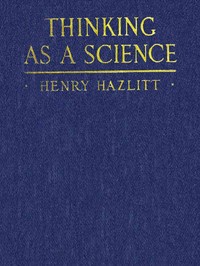Thinking as a Science by Henry Hazlitt
"Thinking as a Science" by Henry Hazlitt is a philosophical treatise written in the early 20th century. The work delves into the nature of thinking, emphasizing that real, purposeful thinking is often neglected in favor of superficial engagement with problems. Hazlitt aims to outline a systematic approach to thinking that can lead to better problem-solving and decision-making skills. The opening of the book introduces the author's core idea that while many people
profess to think deeply about societal problems, they often do not engage in the rigorous, methodical thinking required to understand and address those issues effectively. Hazlitt argues that he, like others, has his own "pet evil" — the neglect of real thinking — which he believes contributes to the myriad of problems faced in society. He critiques the tendency of individuals to seek quick answers through reading rather than reflecting on their thoughts. The chapter sets the stage for a more structured exploration of thinking, advocating for an understanding of how to think critically and creatively to find meaningful solutions to life's significant questions. (This is an automatically generated summary.)
Read or download for free
| How to read | Url | Size | |||
|---|---|---|---|---|---|
| Read now! | https://www.gutenberg.org/ebooks/57243.html.images | 310 kB | |||
| EPUB3 (E-readers incl. Send-to-Kindle) | https://www.gutenberg.org/ebooks/57243.epub3.images | 244 kB | |||
| EPUB (older E-readers) | https://www.gutenberg.org/ebooks/57243.epub.images | 244 kB | |||
| EPUB (no images, older E-readers) | https://www.gutenberg.org/ebooks/57243.epub.noimages | 193 kB | |||
| Kindle | https://www.gutenberg.org/ebooks/57243.kf8.images | 384 kB | |||
| older Kindles | https://www.gutenberg.org/ebooks/57243.kindle.images | 359 kB | |||
| Plain Text UTF-8 | https://www.gutenberg.org/ebooks/57243.txt.utf-8 | 289 kB | |||
| Download HTML (zip) | https://www.gutenberg.org/cache/epub/57243/pg57243-h.zip | 222 kB | |||
| There may be more files related to this item. | |||||
Similar Books
About this eBook
| Author | Hazlitt, Henry, 1894-1993 |
|---|---|
| LoC No. | 16010843 |
| Title | Thinking as a Science |
| Credits |
Produced by Turgut Dincer, RichardW, and the Online Distributed Proofreading Team at www.pgdp.net (This file was produced from images generously made available by The Internet Archive) |
| Reading Level | Reading ease score: 59.8 (10th to 12th grade). Somewhat difficult to read. |
| Language | English |
| LoC Class | BF: Philosophy, Psychology, Religion: Psychology, Philosophy, Psychoanalysis |
| Subject | Thought and thinking |
| Category | Text |
| EBook-No. | 57243 |
| Release Date | May 31, 2018 |
| Copyright Status | Public domain in the USA. |
| Downloads | 339 downloads in the last 30 days. |
| Project Gutenberg eBooks are always free! | |

